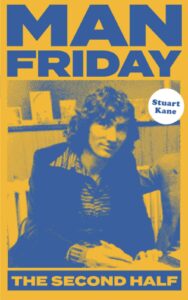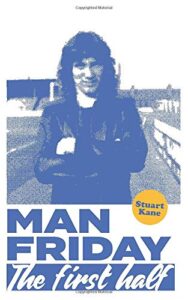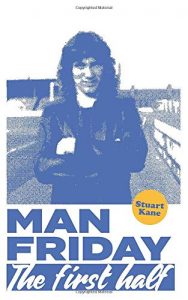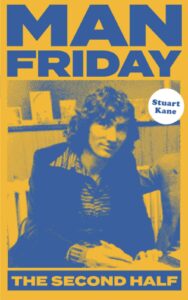Day 1 – Wednesday 10 April 2013
11:00 – 12:00 Captain of Industry
– Sir John Madejski, Chairman, Reading Football Club
– Moderator: Andrew Main Wilson
Andrew Main Wilson (AMW) introduced this session in what he hoped would be a ‘relaxed fireside chat’ with the Reading FC Chairman Sir John Madejski; a man who has taken the club from the ‘old’ Fourth Division to the Premier League.
First up AMW asked Sir John about his desire for a minutes silence at games as a mark of respect following the death of Margaret Thatcher. He responded that it was very much a personal view in that he believed she had put the country on the map and the good achieved outweighed the bad. However, Madejski recognised that in reality it would be too divisive and it was not possible at Reading as they had already planned a minutes silence at the weekend as a mark of respect to the Hillsborough tragedy.
Turning to business, AMW wanted to know what lessons Sir John learned from his building of Auto-Trader. Madejski said that to have a great idea and know how to execute it was vital, ensuring that there was enough people out-there who agreed with that concept. He was of the opinion that marketing was crucial as was retaining 51% of the business. If ownership lay with somebody else, they would ‘call the shots’ not you. Finally Sir John said that you had to believe in what you do and be dedicated in making it successful. AMW wanted to know how he had enabled the business to grow. Madejski explained that at the start they charged £5 for taking a picture of the car to be sold and if it didn’t sell in the first week, the customer got the second week free. The important thing was that by charging upfront there was an immediate cash-flow and in reality a profit from day one.
AMW asked how Sir John became involved in Reading. He explained that in 1990 the club was going bust and got a call from Colin Brooks asking if Madejski would step in. He added that he wasn’t a particularly ‘big’ fan but did it for the community. Reading is the fourth oldest club in the country and he believed it was worth saving.
Sir John was then questioned about the recent change of manager at Reading, given that on the surface it looked like Brian McDermott had managed the club well. He responded that being a football manager was a risky business, but that he was an advocate of continuity. However, Madejski added that it was all about winning matches. Ultimately the sacking of the manager was the decision of the owner Anton Zingarevich. AMW pointed out that at Wigan Athletic they had stuck with Roberto Martinez and they had been rewarded with an appearance in the FA Cup Semi-Final. Sir John agreed, but then poised the question as to whether Reading should have stuck with Brendan Rogers; who knows how things will turn-out. He continued that fans want their club to win as it was their respite from the working week, but that Reading was lucky to have such forgiving fans.
AMW next quizzed Sir John about what in his opinion was the best basis for a relationship between manager and Chairman. Madejski replied that he didn’t believe there was a formula as such, but from his perspective he didn’t know enough about football to tell the manager what to do. The footballing side of the club was the responsibility of the manager, but Sir John did add that everyone has their views. He continued that at Reading there was an ethos, an esprit de corps, which the new owner had bought in to.
It was noted by AMW that when Steve Coppell was manager there was a wage cap at the club. He asked Sir John was this what was needed by the clubs in the bottom half of the Premier League. Madejski stated that in his years as Chairman the biggest increase was in players’ wages and player moves were generally all about who paid more. Therefore given this situation the drive to create a level playing field was nigh on impossible.
Next AMW asked how Reading go about building a global brand and fan-base. Sir John accepted that for an ‘emerging’ club like Reading, that it was difficult. Having a Russian owner had brought in interest of fans from that country and the club was striving to do business in the Middle East. Having players from abroad also sparked interest beyond these shores, but most importantly being in the Premier League gave the club global exposure. Being in the top league in the world was good for the morale of the area. Madejski added that the Premier League was the UK’s best export.
Discussion then turned to parachute payments and the rumour that AMW had heard that next season the bottom club from the Premier League would receive more than Manchester City did when they won the competition. Sir John said that he couldn’t comment, but added that clubs had to be realistic and make the necessary adjustments to contracts etc. if they were relegated.
AMW said that in their first season back last year Reading almost qualified for the Europe League competition. He asked whether for Reading that would have been a mixed blessing. Sir John acknowledged that it was a contentious issue, given that the travel undertaken can mean that money is lost taking part in the tournament. So whilst this season for Swansea, Wigan and Millwall the possibility of European football was attractive, there was a chance that it was not a money-spinner.
For the last part of the session AMW invited the audience to ask questions. The first to Sir John was related to players’ wages and asked why Reading had been against the Financial Fair Play (FFP) Rules. Madejski explained that the reason was that he didn’t believe it would work. He continued that it would be an immensely complex situation attempting to control ‘free trade’ and apply the rules, especially since Sir John believed that ‘big’ clubs would attempt to find ways round the regulations. AMW asked whether change or balance could only be achieved if FFP was applied across Europe. Madejski countered that the attempts to introduce the regulations was highly divisive and that change had to be ‘organic’. He added that we were lucky to have the Premier League and the talent it contains and to try and place restrictions on it would harm the point of the competition.
The next questions asked that with it being difficult for the ‘minnows’ to compete, should there be more done by The FA and the Premier League to level the playing field. Sir John responded that attempting to level the playing field was just not feasible. He continued that Reading owner Anton Zingarevich was going to invest in the Academy set-up at the club so that finding their own talent was the priority, enabling Reading to help themselves.
Whilst on the topic of owner Anton Zingarevich, AMW asked how the Russian had got involved at Reading. Sir John explained that Anton has gone to school in the area and had watched the club. His father bought the club for him and it seemed a ‘good fit’. Madejski added that in the current climate, it was not enough to be a millionaire in the football industry, potential owners needed to be billionaires.
AMW moved onto the subject of the continuing decrease in the number of English players in the Premier League and the fact that it would take 15 years to get a new generation of home-grown talent into the game. He asked Sir John if there was a long-term plan and whether the tide would turn. Madejski said that most clubs saw the benefits of having and developing their own Academy, but added that foreign players had enhanced the game. He continued that any way forward had to be ‘organic’. Ideally clubs would nurture talent and the players would grow up within the organisation, just as happened at FC Barcelona.
The Reading Chairman was then asked for his opinions of Agents. Sir John said they were a bit like Estate Agents, but had become a ‘must-have’ once David Beckham had started the trend. He added that previously the Professional Footballers Association had done a good job, but that Agents were now integral to the game and whilst describing them a ‘parasitical’, recognised they were here to stay.
Madejski was asked if he supported the idea of a European Super League which had relegation and promotion. He acknowledged that there were some people who were keen on the idea, but personally he was against it, adding that it was hardly a ‘green’ option with the increased flying it would necessitate as well as the cost for fans. AMW added that he believed fans in the domestic leagues would be up in arms, especially those in the bottom half.
Sir John was asked if he could understand why some areas of the country were not keen on the idea of a minutes silence for Mrs Thatcher. He responded that because of the good she did she deserved respect, but acknowledged that the view of the former Prime Minister varied greatly in different parts of the country. In closing the session AMW picked up on a quote from Madejski in which he said that when selling a company, you should leave something for the new owners; a form of legacy. Sir John joked that with Reading it was debt, but answered more seriously that after 23 years of the ownership he was immensely proud of the club and it was a relief to be able to go along and enjoy the football and the club, without the responsibility.
 It is July 1976 and Robin Friday is now a Third Division footballer, but he still dreams of reaching the top of his profession.
It is July 1976 and Robin Friday is now a Third Division footballer, but he still dreams of reaching the top of his profession. Robin Friday dreams of being a professional footballer: rejection, drugs, borstal, and a near-fatal industrial accident won’t stop him.
Robin Friday dreams of being a professional footballer: rejection, drugs, borstal, and a near-fatal industrial accident won’t stop him. This is the second part of Stuart Kane’s work on the ex-Reading and Cardiff City player Robin Friday. The first book was reviewed by FBR back in September 2020 and can be found
This is the second part of Stuart Kane’s work on the ex-Reading and Cardiff City player Robin Friday. The first book was reviewed by FBR back in September 2020 and can be found  Stylistically the book continues in its biographical fiction form as Kane once more combines real-life events and fictional narrative to get inside the head of Robin Friday. However, there is a distinct difference in focus which derives from all that was happening in Friday’s life. In the first book, covering his playing career during the 1973/74, 1974/75 and 1975/76 campaigns, readers get more detail around the mercurial player and his time at Reading on the pitch. Here in the second book, over the following three seasons, Friday makes just half the number of appearances as he did in his first three years as a professional with Friday’s life off the pitch now the dominant force. The joy of playing that was evident in the first book is plainly missing here in the second as Kane conveys to the reader how drug addiction and drinking came to take over Robin’s life. Apart from his dazzling debut for Cardiff against Fulham, in which he outplays former England captain Bobby Moore, the football detailed in this second instalment feels like a struggle for Friday as he fights against a body wracked by the ruthless challenges of brutal opponents and its cravings for the next fix.
Stylistically the book continues in its biographical fiction form as Kane once more combines real-life events and fictional narrative to get inside the head of Robin Friday. However, there is a distinct difference in focus which derives from all that was happening in Friday’s life. In the first book, covering his playing career during the 1973/74, 1974/75 and 1975/76 campaigns, readers get more detail around the mercurial player and his time at Reading on the pitch. Here in the second book, over the following three seasons, Friday makes just half the number of appearances as he did in his first three years as a professional with Friday’s life off the pitch now the dominant force. The joy of playing that was evident in the first book is plainly missing here in the second as Kane conveys to the reader how drug addiction and drinking came to take over Robin’s life. Apart from his dazzling debut for Cardiff against Fulham, in which he outplays former England captain Bobby Moore, the football detailed in this second instalment feels like a struggle for Friday as he fights against a body wracked by the ruthless challenges of brutal opponents and its cravings for the next fix. Where to start? Well, the back cover of this book defines itself as “biographical fiction” so a definition of the term is as good a place as any to begin. In essence, biographical fiction is a form of writing which takes a real-life individual and combines actual events in their life with a fictional narrative in which other situations and characters are created to tell the story.
Where to start? Well, the back cover of this book defines itself as “biographical fiction” so a definition of the term is as good a place as any to begin. In essence, biographical fiction is a form of writing which takes a real-life individual and combines actual events in their life with a fictional narrative in which other situations and characters are created to tell the story.